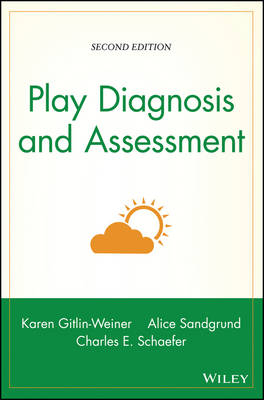
Play Diagnosis and Assessment
John Wiley & Sons Inc (Verlag)
978-0-471-25457-7 (ISBN)
The leading resource on identifying children's problems throughplay therapy--completely revised The first edition of PlayDiagnosis and Assessment was the first volume of its kind toprovide a comprehensive overview of the diagnosis and assessment ofchildren through play. Over the past several years, numerouschanges within the field have encouraged the development ofimproved techniques that surpass traditional assessment protocolsand methods, such as new scales, more focused procedures, andinstruments with higher levels of reliability and validity thanhave been previously established. Now, this classic book has beenupdated to address and reflect these ongoing changes. Focusing onthe needs of the clinician, this new edition presents empiricallytested diagnostic tools and describes improvements to existing playtherapy assessment instruments, such as new testing instruments fortime-limited therapy and early intervention assessment tools foryoung children. The book is divided into six sections:
* Developmental Play Assessments
* Diagnostic Play Assessments
* Parent-Child Interaction Play Assessments
* Family Play Assessments
* Peer Interaction Play Assessments
* Projective Play Assessments
The procedures described in each section target a variety of agesand populations, representing some of the most valuable,informative, and sensitive contributions to the field. Integratingformal research with clinical methods, Play Diagnosis andAssessment, Second Edition is the definitive resource forclinicians dedicated to the identification of children's problemsand the best ways to intervene through the lighthearted andproductive use of play therapy.
KAREN GITLIN-WEINER, PhD, is a licensed psychologist and the author of numerous professional articles. She maintains a private practice that focuses on children, adolescents, and their families. For the past twenty years, she has worked as a special educator, consultant, and/or psychologist in different settings for emotionally, behaviorally, and learning-handicapped youngsters of various ages. ALICE SANDGRUND, PhD, is Director of Training at the Division of Child and Adolescent Psychology at Kings County Hospital in Brooklyn, New York. She has authored a number of articles in the field of child psychology. CHARLES SCHAEFER, PhD, is founder and past president of the Center for Play Therapy; he is also the editor of several bestselling books on play therapy.
DEVELOPMENTAL PLAY ASSESSMENTS.
A Scale for Assessing Development of Children's Play (C.Westby).
Assessing the Cognitive Ability of Infants and Toddlers ThroughPlay: The Symbolic Play Test (T. Power & J. Radcliffe).
Standardized Play Assessment of Infant and Toddler Temperament (A.Matheny).
The Play History Interview (K. Taylor, et al.).
Transdisciplinary Play-Based Assessment (T. Linder).
DIAGNOSTIC PLAY ASSESSMENTS.
Kiddie Formal Thought Disorder Rating Scale and Story Game (R.Caplan & T. Sherman).
Using Anatomically Detailed Dolls in Interviewing Preschoolers (S.White).
Linking Assessment to Intervention for Children with DevelopmentalDisabilities or At-Risk for Developmental Delay: The DevelopmentalPlay Assessment (DPA) Instrument (K. Lifter).
The Play Observation Kit (POKIT): An Observational AssessmentTechnique for Young Children (K. Mogford-Bevan).
PARENT-CHILD INTERACTION PLAY ASSESSMENTS.
Assessing Mother-Infant Interaction in Play (L. Roggman, etal.).
Parent-Child Interaction Play Assessment (D. Smith).
Assessing Parent-Child Interactions with the Marschak InteractionMethod (MIM) (S. Lindaman, et al.).
"Going to the Store": An Observational Measure of Parent-ChildInteractions for Preschoolers (J. Dumas & P. LaFreniere).
FAMILY PLAY ASSESSMENTS.
Family System Test (FAST): A Systemic Approach for FamilyEvaluation in Clinical Practice and Research (T. Gehring & J.Page).
Assessing Family Interaction by the Collaborative Drawing Technique(G. Smith).
Dynamic Play Approaches in the Observation of Family Relationships(S. Harvey).
Assessment of the Child and Family in Play Contexts (G. Stollak, etal.).
PEER INTERACTION PLAY ASSESSMENTS.
Play Assessment of Peer Interaction in Children (J. Welsh, etal.).
Observing for Individual Differences in the Social InteractionStyles of Preschool Children (M. Segal, et al.).
Assessing Nonsocial Play in Early Childhood: Conceptual andMethodological Approaches (R. Coplan).
Penn Interactive Peer Play Scale: A Parent and Teacher RatingSystem for Young Children (J. Fantuzzo & V. Hampton).
PROJECTIVE PLAY ASSESSMENTS.
The MUG and the Teddy Bears' Picnic: Story-telling Techniques forthe Assessment of Children's Emotional and Behavioral Problems (N.Mueller).
The Family Puppet Technique for Assessing Parent-Child and FamilyInteraction Patterns (P. Ross).
The Use of a Puppet Interview to Understand Children (E.Irwin).
The Puppet Sentence Completion Task (S. Knell & K. Beck).
Play Assessment of Affect: The Affect in Play Scale (S. Russ, etal.).
Indexes.
| Erscheint lt. Verlag | 20.3.2000 |
|---|---|
| Verlagsort | New York |
| Sprache | englisch |
| Maße | 184 x 259 mm |
| Gewicht | 1554 g |
| Themenwelt | Geisteswissenschaften ► Psychologie ► Entwicklungspsychologie |
| Medizin / Pharmazie ► Medizinische Fachgebiete ► Pädiatrie | |
| Medizin / Pharmazie ► Medizinische Fachgebiete ► Psychiatrie / Psychotherapie | |
| ISBN-10 | 0-471-25457-6 / 0471254576 |
| ISBN-13 | 978-0-471-25457-7 / 9780471254577 |
| Zustand | Neuware |
| Haben Sie eine Frage zum Produkt? |
aus dem Bereich


